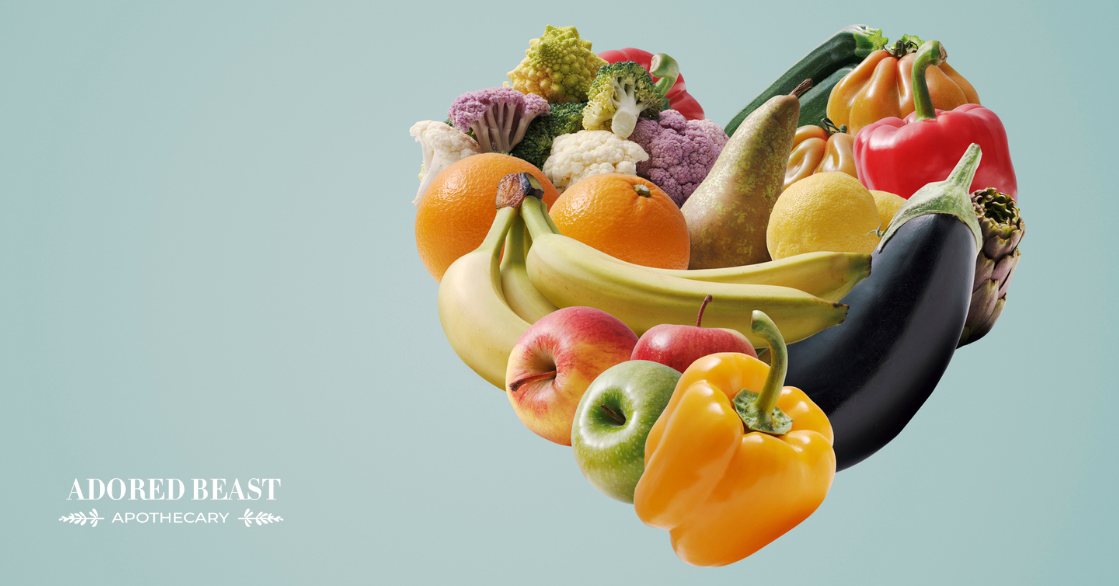When it comes to what we feed our animals, the foods we choose can have a huge impact on overall health and wellbeing.
Certain foods can help regulate the immune system or protect the gut. Some provide valuable nutrition. Others can even fight cancer. By making informed choices, providing a variety of foods, and feeding for life and longevity, we can give our animals the best chance of a long, happy, healthy life.
But sometimes we get lost in the quagmire and forget that simple is important too. We don’t have to feed every fruit, vegetable, protein, etc., under the sun for real health. Nor do we have to add 85 supplements a day to keep our animals healthy. There really is value in the simple.
So this week, we’re keeping it short and sweet. We’re talking whole vs. processed food – what’s the difference, and which one do we recommend?
What is Whole Food?
Simply put, whole foods are foods that have not been processed, or have been processed very minimally. Whole foods are foods that are in their natural state – or as close to it as possible – when you buy them.
Whole foods don’t have additives – no added sugars, flavours, or starches. They are not primarily produced in a factory. And you won’t see preservatives either – whole foods don’t have lengthy expiration dates, and they’re not intended to.
Sometimes, an easy way to determine if a food is whole or processed is to look at the ingredient list. Whole foods typically don’t have ingredient lists because they ARE the ingredient. You won’t see an ingredient list on an apple, or a bunch of kale, or a crown of broccoli. Or, if the whole food does have some type of packaging, and there is an ingredient list, the only thing you should see on it is that single food – the apple, the kale, the broccoli.
What are some of our favourite whole foods? Any of these are great when fed in rotation and moderation:
- eggs
- fresh fruits
- fresh vegetables
- raw meat
- goat’s milk
Frozen fruits and vegetables are minimally processed and can be an economical alternative, just watch out for additives. Keep in mind that canned foods do lose some nutrients during processing. And definitely watch the additives! Most canned fruits come in juices that are full of sugar and other preservatives, and vegetables will often contain added sodium – both things your animal doesn’t need.
Additionally, always consider how important sourcing is, especially with fresh vegetables, fruits, and meat. Whenever possible, try to look for organic whole foods. Every year, The Environmental Working Group compiles a list every year of the most and least contaminated produce and updates it every year. These are known as the ‘Clean 15’ and the “Dirty Dozen.’ You can find more about these foods at this post: Should You Wash Fruits and Vegetables?
What is Processed Food?
In contrast to whole foods, processed foods are those foods that have been altered from their natural state in some way.
This alteration can include food that has been commercially cut or washed, food that has been heated, pasteurized, homogenized, canned, cooked, frozen, dried, freeze-dried, dehydrated, mixed, or packaged. It also can include food that has added preservatives, nutrients, flavours, salts, sugars, or fats.
Now, while we tend to think of processed foods as “bad,” that’s a general statement that definitely doesn’t apply to all foods.
There are different levels of processing. Those levels are what determine what we reach for and what we avoid when it comes to our animals (and ourselves). And some minimally processed foods can be a part of a healthy diet.
For example, some fresh fruits or vegetables are washed (in water) before being packaged. Nothing has been added or taken away, but technically, by definition, they’ve been processed. Minimally – but processed all the same.
Kefir is another example. The fermentation process used to make kefir is not natural. You wouldn’t find kefir out in nature. But the process is healthy, and if minimal, kefir can be a valuable addition to the regular rotation.
Alternatively, ultra-processed options have a lot of preservatives, dyes, colours, added flavours, non-sugar sweeteners, or other ingredients that change the texture, appearance, or flavour of the food. We wouldn’t consider these whole foods by any stretch of the imagination.
Whole vs. Processed Food: What’s Our Recommendation?
There are many different ways to feed our animals. And we all feed what we do for a reason. Maybe that’s a primarily raw meat diet. Perhaps it’s home cooked or dehydrated. Maybe it’s kibble. Or maybe it’s a combination of several different types of food.
Whatever it is, whole foods or minimally processed foods can always be rotated into the mix for added value.
For example, if you feed raw meat, add an egg to the bowl once or twice a week (and don’t forget the eggshell membrane).
If it’s home cooked, think about rotating in a few different vegetables or fruits.
If it’s kibble, eggs, fruits and veggies, and kefir can all be added in rotation to provide a variety of valuable nutrition to the diet.
There’s no one “right way” to feed our animals. There are so many different options available out there, and it can be hard to know when we’ve got it perfectly correct. But don’t be discouraged – there isn’t “one” perfectly correct menu!
And remember, it’s equally as important to consider not only what you’re adding to the bowl, but also what you’re not. By focussing on whole food ingredients, we can up the nutritional ante while at the same time make the choice to not add flavours, sugars, salts, etc., that can contribute to the development of disease states in the body.
By knowing the difference between whole vs. processed food, and picking some whole food options to add to the bowl, you’ll be providing your animal with highly beneficial nutrition – along with a whole lot of love! And at the end of the day, that’s the most valuable ingredient of them all.












